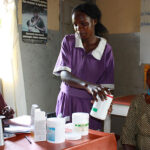In recent months, political tensions and power struggles have made headlines in Uganda’s healthcare sector, most notably with the increasing friction between the Minister of Gender, Labour and Social Development, Betty Amongi, and the Minister of Health, Dr. Ruth Aceng. Amidst these escalating tensions, Amongi’s intentions regarding Aceng’s position have come to light, raising questions about the implications for Uganda’s healthcare system.
The Power Play: Why Amongi Seeks Aceng’s Exit
Betty Amongi has publicly expressed her dissatisfaction with Dr. Ruth Aceng’s management of the Ministry of Health, particularly in the wake of Uganda’s response to the COVID-19 pandemic and various healthcare reforms. During an interview with New Vision, Amongi voiced her concerns regarding the inefficiency and perceived ineffectiveness in Aceng’s leadership. She argued that the health sector has been plagued by shortages in medical supplies, insufficient infrastructure, and a lack of strategic planning—issues that have been exacerbated by the pressures of COVID-19.
Amongi has accused Aceng’s ministry of failing to take decisive action to address the health challenges facing the nation, including the HIV/AIDS epidemic, maternal health issues, and a lack of accessibility to vital medical services. With the Ugandan government receiving significant international aid and funding for healthcare improvements, Amongi’s insistence on change in leadership hints at a broader strategy to garner accountability and enhance health service delivery.
Dr. Aceng’s Response and Insights on the Healthcare Dilemma
In response to the criticism and calls for her resignation, Dr. Ruth Aceng has defended her tenure by highlighting the successes and challenges of the health sector. She emphasized that the pandemic posed unprecedented challenges, which necessitated urgent and sometimes difficult decisions. Aceng has pointed out that while problems do exist, a considerable improvement in health indicators over recent years is evidence of effective initiatives taken under her stewardship.
Aceng also opened up to New Vision about Uganda’s broader medical status, emphasizing the need for integrated healthcare systems that prioritize preventive measures and public health education. She discussed the importance of increasing public-private partnerships to strengthen healthcare delivery and expand access to quality services. Moreover, she highlighted the commitment to ensure that Uganda meets the World Health Organization’s guidelines for health service accessibility, focusing particularly on rural and underserved communities.
The Current State of Healthcare in Uganda
Uganda’s healthcare system is at a critical crossroads. While the government has made strides in improving health outcomes—such as reducing child mortality and increasing access to antiretroviral therapy—substantial challenges remain. According to the Uganda Health Sector Development Plan, many health facilities still lack basic resources, and healthcare workers face chronic shortages.
Recent reports indicate that over 50% of health facilities in Uganda are under-resourced, particularly in rural areas, where medical infrastructure is often lacking. The ongoing debates surrounding Aceng’s leadership further underscore the need for strong oversight and innovative approaches to solve these systemic issues.
Furthermore, issues such as corruption, underfunding, and bureaucratic inefficiencies are pressing concerns. As Amongi and Aceng navigate their political battle, the focus must remain on improving healthcare access and quality for all Ugandans.
Conclusion: The Need for Unified Leadership
As Betty Amongi’s calls for Dr. Ruth Aceng’s resignation continue to stir controversy, the real question remains: what is best for Uganda’s healthcare system? While power struggles within government can be illuminating, the focus must pivot toward solutions that prioritize health outcomes for the population. Stakeholders across all levels must advocate for a healthcare system that promotes accountability, enhances resource allocation, and ultimately leads to a healthier Uganda. It is through collaborative leadership and an unwavering commitment to public health that the vision for a robust healthcare system can be realized.
Email Us on editorial@nnafrica.com













